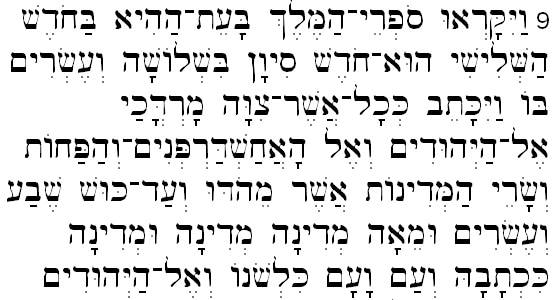
There’s something unique about the longest verse in the Bible that takes it from being a Bible Trivia question to being essential to the storyline of Scripture. But, before we get into the reason for its significance, what is the longest verse in the Bible?
What is the longest verse in the Bible? The longest verse in the Bible is Esther 8:9. It is 43 words and 192 letters long in the original Hebrew. There is no special significance in its length since the original was not divided into verses, but the meaning of the verse is absolutely essential to the storyline of the entire Bible.
Here is the verse in an English translation (English Standard Version) so you can get an idea of how long it is. This English translation is 80 words long.
The king’s scribes were summoned at that time, in the third month, which is the month of Sivan, on the twenty-third day. And an edict was written, according to all that Mordecai commanded concerning the Jews, to the satraps and the governors and the officials of the provinces from India to Ethiopia, 127 provinces, to each province in its own script and to each people in its own language, and also to the Jews in their script and their language.
Esther 8:9
On the surface, it would seem like simply a matter of finding the verse with the most number of words, but arriving at the answer is not as straightforward. And although we’ll see that the length of the actual verse is not significant, the events recorded in Esther 8:9 are absolutely pivotal in the history of the Jewish people in the Old Testament and in the overall progression of events in the Bible.
Table of Contents
- The Longest Verse in the Bible in Hebrew
- The Actual Length of Esther 8:9 Is Not Significant
- The Meaning of Esther 8:9 Is Very Significant
- If the Events of Esther 8:9 Had Not Come About…
The Longest Verse in the Bible in Hebrew
The Bible was originally written in mostly Hebrew and Greek with a little bit in Aramaic. So, to measure the longest verse in the Bible, we have to count the Hebrew or Greek words or letters to be accurate.
English as a language did not exist when the Bible was originally written. The English translations of the Bible have a different number of words in the verse, so it wouldn’t make sense to measure the longest verse in English. Esther 8:9 does come out as the longest verse in most English translations as well.
Here is the verse in the original Hebrew. Although Hebrew is read from right to left, you can see that there are groups of Hebrew letters making up 43 words.

The Actual Length of Esther 8:9 Is Not Significant
The chapter and verse numbers were not part of the original books of the Bible. The Chapter divisions found in modern translations were first introduced in the early 13th century and the verse divisions we use were adopted around the mid-16th century.
Some sentences in the bible are spread out over 2 or more verses and some verses contain more than one sentence. All this is means is that the length of the verse was not part of the original author’s intent.
So, in this case, a more interesting question to ask might be: “What is the longest sentence in the Bible?” The longest sentence in the Bible is Ephesians 1:3-14. Those 12 verses contain only 1 sentence! In this case, the length of one sentence in Greek that spans 12 verses is quite significant as it describes how God has blessed us tremendously in Christ.
The Meaning of Esther 8:9 Is Very Significant
Back to Esther 8:9, at first glance, it can seem like its a random verse about how an edict was passed at some point in history. The significance of Esther 8:9 is that it’s about a law that saved the Jewish people from extermination. Not only that, it turned out for an occasion for their enemies to be eliminated.
Esther 8:9 is a parallel passage to Esther 3:12. The wording is very similar and the details about the process of how the law is communicated are similar. Here is Esther 3:12.
Then the king’s scribes were summoned on the thirteenth day of the first month, and an edict, according to all that Haman commanded, was written to the king’s satraps and to the governors over all the provinces and to the officials of all the peoples, to every province in its own script and every people in its own language. It was written in the name of King Ahasuerus and sealed with the king’s signet ring.
Esther 3:12
The difference is that Esther 3:12 is another law that was previously passed. It was one that Haman, an enemy of the Jewish people, was involved in passing.
Haman was an official in the Persian Empire who wanted to kill all the Jews. He had been offended by Mordecai because he would not bow down to him and pay him honor. Haman wanted to not only kill Mordecai but his entire people, the Jews.
Haman tells King Ahasuerus that the Jewish people follow their own laws and not the laws of the king. Haman deceives the king into passing a law that would kill all the Jewish people, including the women and children.
Letters were sent by couriers to all the king’s provinces with instruction to destroy, to kill, and to annihilate all Jews, young and old, women and children, in one day, the thirteenth day of the twelfth month, which is the month of Adar, and to plunder their goods.
Esther 3:13
Mordecai convinces his niece, Queen Esther, who had kept her Jewish identity a secret up until this point, to bring this matter to the king. Esther was putting her life on the line.
The King grants Esther wish and another law is passed that allows the Jewish people to defend themselves and plunder their enemies on the same day that the slaughter of the Jews was originally planned.
Once the king passed a law, it could not be directly canceled or reversed, so another law was passed. This is the second law that Esther 8:9 records. The law in Esther 8:9 effectively nullified the one in Esther 3:13.
Esther 8:9 describes how the king’s scribes were summoned and who the law was sent to. One difference between Esther 8:9 and Esther 3:13 is that this second time, the law was written in the language of the Jewish people as well as all the other major languages that the first edict was written in.
Although the length of Esther 8:9 might be significant, the events and meaning of the verse are very significant.
If the Events of Esther 8:9 Had Not Come About…
- The Jewish people would have been exterminated. Haman’s plan of mass murder would have gone forth and we would be talking today about events of ancient history and not about a people and land, Isreal and the Jewish people, that still exists today after thousands of years.
- God’s character, power, and faithfulness to keep His promises would be brought into question. Would God be able and willing to bring His people back from captivity into the land that had been promised to them?
- God’s plan of redemption to bring about a Savior through the lineage of Abraham and King David would have been at stake. Jesus Christ was born from this physical ancestry, as a person of Jewish descent.
There is a chapter of the Bible where its length is directly related to its significance. You can read about it here: The Longest Psalm in the Bible and Why It’s the Perfect Length.
And here is an article that explains the Bible with a simple diagram. It includes a little bit more about the importance of the Jewish people in God’s overall plan and the storyline of the Bible. You can read about it here: The Bible Explained for Beginners (Simple Guide & Diagram).
Subscribe to my newsletter for updates and encouraging content.
Photo Credit:
Photo by Church of the King on Unsplash

Your article helped me a lot, is there any more related content? Thanks!